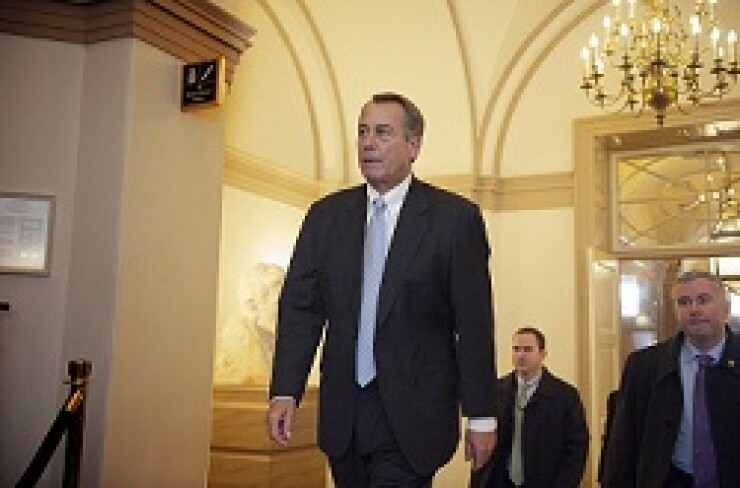
The White House and congressional negotiators agreed to contours of a budget deal including tax cut extensions, with the remaining sticking point being how to avert automatic federal spending cuts, said an official familiar with the talks.
The official described the proposed framework as the White House announced President Barack Obama’s plans to deliver remarks at 1:30 p.m. Washington time on the status of the talks. Under the proposed deal, income tax cuts would be extended for annual income up to $450,000, the official said, with rates rising to 39.6 percent on income above that. Expanded unemployment insurance would be continued through 2013.
Lawmakers are seeking to avert more than $600 billion in tax increases and spending cuts that make up the so-called fiscal cliff. Even if a deal is reached and can get through both chambers of Congress, it would be more limited than President Barack Obama and leaders of both parties sought. It would set up another battle early in 2013 over the budget and the federal debt limit.
Some Senate Democrats expressed resistance toward an income threshold for increased tax rates that would be higher than the $250,000 they sought.
Senator Tom Harkin, an Iowa Democrat, said on the Senate floor this morning that he doesn’t support a $450,000 income threshold, signaling that a deal reached by Vice President Joe Biden and McConnell could lose the votes of some Democrats.
'DOESN'T AGREE'
“This is one Democrat that doesn’t agree with that -- at all,” Harkin said on the Senate floor. “We’re going to lock in forever the idea that $450,000 a year is middle class in America?”
Capital gains and dividend rates would rise to 23.8 percent for top earners, including taxes as part of the 2010 health-care law, according to the official.
Estate tax rates would rise to 40 percent on amounts above $5 million. Extensions of business tax breaks would continue through the end of 2013. The measure would permanently prevent an expansion of the alternative minimum tax.
It also would avert a cut in Medicare payments to doctors through 2013. The possible deal would generate $600 billion in new revenue.
Earlier in the day, Senate Majority Leader Harry Reid said negotiators could reach a U.S. budget deal today that would protect all but top earners from a tax increase at midnight.
TWO YEARS
Democrats have sought to delay the automatic federal spending cuts for two years, at a cost of $200 billion, though they haven’t identified other savings to pay for it.
Republicans insisted that the spending cuts be offset with savings elsewhere in the budget and that new revenue should be used to reduce the deficit.
Talks between Reid and McConnell stalled yesterday, and McConnell reached out to Biden in an effort to break the impasse.
Representative Chris Van Hollen of Maryland, the top Democrat on the House Budget Committee, told Bloomberg Television today that the odds of reaching a deal are “a little better than 50-50” while noting that “a lot has to go right.”
Stocks rose. The Standard & Poor’s 500 Index gained 0.2 percent to 1,405.49 at 11:29 a.m. in New York. The Dow Jones Industrial Average fell 6.88 points, or 0.1 percent, to 12,931.23 today. The benchmark 10-year Treasury bond yield increased three basis points, or 0.03 percentage point, to 1.73 percent at 11:26 a.m. in New York, according to Bloomberg Bond Trader prices.
TAX CUTS
Tax cuts first enacted during George W. Bush’s presidency are scheduled to expire tonight. Obama and other Democrats have sought to extend the reductions for married couples’ income up to $250,000 a year while letting tax rates rise for income above that amount. Republicans oppose tax rate increases for any income level.
Allowing the fiscal changes to take effect would cause a recession in the first half of 2013, according to the Congressional Budget Office.
In the event the Senate can’t reach a compromise, Obama has asked Reid to ready a bare-bones bill for a vote today to extend expanded unemployment benefits and tax cuts on family income up to $250,000.
If Congress does nothing, taxes will rise in 2013 by an average of $3,446 for U.S. households, according to the nonpartisan Tax Policy Center in Washington.
Tax filing for as many as two-thirds of U.S. taxpayers could be delayed into at least late March. Defense spending would be cut, and the economy would probably enter a recession in the first half of 2013, according to the Congressional Budget Office.
The effects of the higher tax rates and federal spending cuts would accumulate over a matter of months. Congress could reverse them by acting retroactively in 2013.





